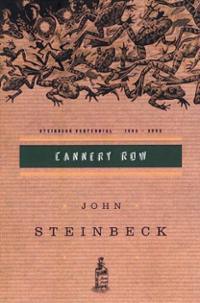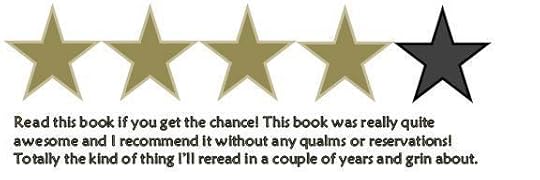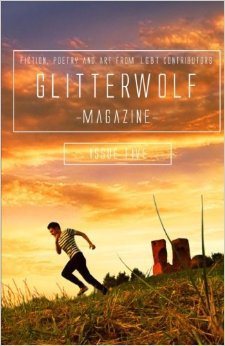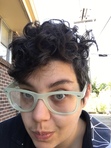B.R. Sanders's Blog, page 38
March 4, 2014
The Hearthstone #1: I Would Never Hurt You, or Parenting as a Survivor of Childhood Abuse
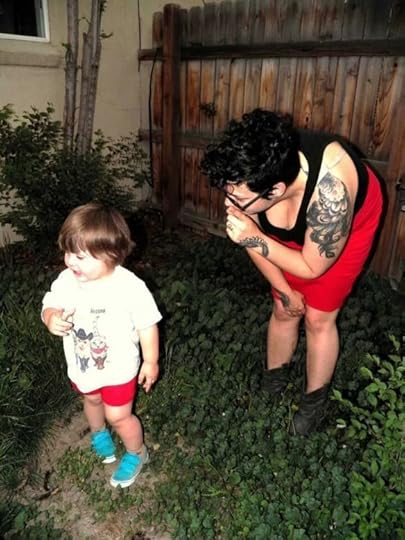
me not hurting my kid
“Don’t hurt me.”
The first time my child said this to me, we were at Target. I’d just told her to put a box of something or other back, and she stared up at me with these huge, innocent blue eyes and whispered it in a low, sad voice. It shattered me. I swept her up into my arms and hugged her tight. “I would never,” I said. “I would never hurt you.”
The thing is that my kid is a liar. She’s two and a half, and she’s clever, and like all kids that age she is old enough to manipulate the people around her but she’s not old enough to have developed a sense of morality yet. I don’t know where she picked up this particular phrase. Adventure Time, maybe. Or Babar. Or from some other kid at play group. It doesn’t really matter where she learned it; what matters is she doesn’t really know what it means. When my kid says not to hurt her, what she’s really saying is I don’t like this, why are you taking that dangerous thing away from me, don’t turn off my tv show! It’s not about physical injury. She’s not scared of me. It’s a prelude to a tantrum; a baby’s feint. I know this, I do.
My reaction to her words has less to do with her and more to do with how I, at nearly thirty years old, am still making peace with how I grew up. My kid is experiencing a very different kind of childhood than I did. “Don’t hurt me,” she says, and specters of my childhood creep up: I’m twelve, and my drunk mother is throwing plates at me. I’m ten, and my mother is driving drunk with me in the car. I’m sixteen, and my father slaps me hard across the face—not once, but four times in quick succession. I’m thirteen, and my mother paws at me like a sedated bear in a drunken stupor while I try to pull her out of the bathroom during yet another botched suicide attempt. My kid tells me not to hurt her, and all I can think about is the sad resignation I lived with for so long, that knowledge that the people you should be able to trust can and will hurt you. That your place is to bear it, to live through it, until you can finally get away.
My child doesn’t know about terror. She has not two, but three adoring and doting parents. She is protected and loved and cherished, and our home is safe and stable and decidedly non-violent. Her father, who himself had a wonderful and loving childhood, sometimes has to translate our daughter’s words for me. “Don’t hurt me,” she says, and he watches my face fall. “No, no,” he says, “she’s not scared of you! She’s not! I promise!”
But how could he know? I am a psychologist by training. I know the literature; I know that abuse is cyclical, that abused kids often turn into abusive parents. It feels so fatalistic sometimes. I also know I’m not my parents—I am not an alcoholic, I work intentionally and authentically on my mental health. In the parlance of the small, poor Texas town in which I grew up, I have my shit together. Or, at least I think I do. I am perpetually afraid to let my guard down. I am afraid that if I don’t watch myself like a hawk I will turn into my parents, and I will hurt her—on purpose, with full knowledge of what I’m doing, in some kind of sick power-play. I love her so much that I’m scared to trust myself. It’s unreasonable, this lack of trust. It’s a scar from my own childhood, where I spent so much time apologizing for my parents’ behavior. It’s their mistakes I bear like a cross, now, and not my own. But these scars run deep, and they are hard to eradicate.
“Try not to take it personally,” her dad says. “She says it to me, too.” But hearing those words from her mouth dredge up in me a visceral, PTSD-like physical memory of the abuse I survived. I wonder, sometimes, how she and I will talk about her childhood when she’s grown. Her experience—solidly middle-class in a nurturing and attentive family—is so different from mine. I know, logically, that she’s telling me not to hurt her precisely because she doesn’t really know what being hurt by her parents means. I also know that it’s hard for survivors to articulate our pasts to those who haven’t lived through similar ones.
“Don’t hurt me,” she says, like my own personal nightmare.
“I would never. I would never hurt you,” I tell her, holding her close. And it’s a promise to her, and it’s a promise to myself. A way to reassure her and to keep myself sane. She is safe with me, not safe from me.


February 27, 2014
Disability Diary #2: WORKING Interview with Sarah McCarry
Disability Diary #2: WORKING Interview with Sarah McCarry
Sarah McCarry, who is beyond awesome, recently started the Working Project, where she interviews women and trans* writers who experience mental illness. The Working interviews are a space where these writers articulate the way their experience of mental illness impacts and intersects with the act of writing.
I expressed interest in participating in her project, and Sarah generously agreed to interview. My interview is up on her blog now, and I am honored and thrilled to be a part of this ongoing project. If you’re at all interested in first person accounts of writing life, mental illness and the combination of the two, I encourage you to read the whole set of interviews. And if you’re a woman or trans* writer who experiences mental illness and is comfortable speaking about it, I encourage you to contact Sarah.


February 25, 2014
Disability Diary #1: Anxiety Spike
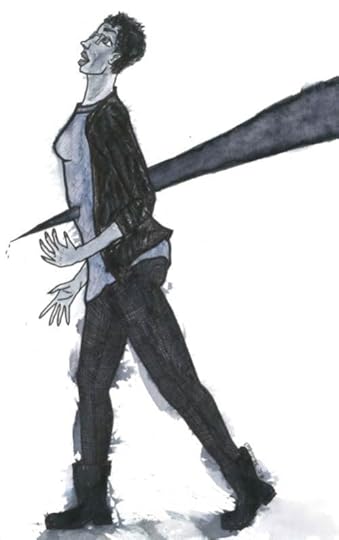
Anxiety Spike, B R Sanders, 2/23/2014
I am a very verbal person; hence all the writing I do. One of the most terrifying and debilitating things about the way my mental health issues manifest is that both anxiety and depression can strip me of my words. Sometimes the actual physical experience of anxiety—the panic, the fight or flight anticipation bred in every single nerve—is too total and too overwhelming to verbally describe. And steeped as I am in language this is incredibly unnerving.
There are times when depression or anxiety blankets me and turns me mute. And in those moments, the best I can do is draw what it feels like. There’s a power in naming something. Naming a thing can make it easier to cope with, can make it real and tangible. When my mental illness gets the better of me and sidesteps the naming sometimes I can capture it visually, and that can help defang and demystify it, too.
I’ve been dealing with a massive spike in anxiety lately, attributable to absolutely nothing. It’s maddening, quite literally. It has me all turned around, and it’s becoming increasingly clear it’s waning into a somewhat mild depression*. I’m at the point, now, where there’s little to do but live in it. It will pass. That’s what I keep telling myself. These bouts of frantic anxiety and flat depression are intermittent, which means they will pass, they always pass. They will come again, and sometime in the future I’ll find myself impaled by insecurity and self-doubt, but that’s the future, and before that happens there will be a calm. I just have to get to the calm.
*Mild depression. What a misnomer.


February 23, 2014
RESISTANCE has a release date!
Hey friends! Resistance has a release date! The book is slated to drop March 15th. Stay tuned for further updates!
Here’s the blurb:
Resistance has many faces, and one of them is Shandolin’s. When she finds her friend brutally murdered, Shandolin knows that her life as an elf living in the City of Mages under the heel of the Qin is going to get a whole lot harder. Though the Qin have her in their sights and put an assassin on her trail, Shandolin decides to fight instead of run–but her only hope of survival is a takeover of the City government.
Shandolin draws everyone she loves into the fray with her: her assassin lover, Rivna, who would prefer a quiet life; her mentor, Moshel, whose history with the Qin leaves him paralyzed and frightened; and her best friend, Kel, who has too many mouths to feed to play a losing game of politics. Apart, they are weak, but together Shandolin and her friends, lovers and fellows may be just strong enough to save their skins and the skins of the other elves in the City.
Set in the unique and finely realized fantasy universe of Aerdh, RESISTANCE is about the big and small ways hunted people fight back, and what it may cost them if they win the fight.


February 20, 2014
This blog is about to get personal
Since starting this blog I’ve tried to keep it just focused on the writing. But the longer this blog goes on, the less this division makes sense. I’m not interested in branding myself as an author unless that brand authentically represents who I am. The reason is because within me the distinction of “B Sanders, writer” and “B Sanders, person” doesn’t truly exist. I can’t parcel myself off that way, and when I do this blog devolves into nothing but book reviews and random quippy updates about my works in progress.
I want this to be a blog with some meat to it. And some bite to it. I’d like to write more about my life and personal experiences, not just out of some navel-gazey introspective overshare impulse but because my personal experiences directly inform my fiction writing.
The truth is that nothing ever comes from a vacuum. I am post-modern enough to acknowledge that the meaning of any piece of art varies and is ultimately forged by the audience. But it’s also true that both the creator and the audience for a piece of art are mired deeply in their respective social positions with the norms and social conditioning and lived experience that go with those respective social positions. My life informs how I write a book as much as a reader’s life informs how they read that same book.
And more than that, a big piece of why I write what I do is to give representation and voice to experiences and identities that are typically silenced and stigmatized. So, I write about queer love and gender variance and disability and class. But it shouldn’t just stop there. I hope, too, by making this blog more personal that I can help shift conversations around gender and sexuality and disability and class in real-time, in this world in which you and I both live.
Because I think best in lists, I’ll be working on the following post series in addition to the more writing-focused content I’ve produced thus far:
Disability Diary – I’ll tag any and all posts about my experiences with mental and physical disabilities here. I deal with anxiety, depression and migraines.
The Hearthstone – I’ll tag any and all posts about living and growing a nontraditional family here.
Transistor Radio – I’ll tag any and all posts about my gender identity, trans* experiences, etc here.
Feel free to read or ignore as you see fit.


February 18, 2014
Book Review: CANNERY ROW
Cannery Row is about Cannery Row in Monterey, California circa 1945. The inhabitants of Cannery Row are like furnishings or decorations, and the real narrative here is about life on the edge of the sea itself. This is a charming book, a book that seems simple on the surface but really is quite complex. It’s a sweet and sad little book with interwoven narrative threads that never quite amount to an actual plot. It’s a book that makes me think of listening to your grandpa drone on and on about the good old days but only if your grandpa is witty and sweet and recognizes that the good old days weren’t really all that good all the time. Cannery Row is well worth reading.
And, oh, friends and fellow readers, Cannery Row broke my heart. I think there’s something in this short and simply written book to break just about everyone’s heart. Steinbeck is very good at capturing the full spectrum of life with all its myriad hopes and all its plural wounds. I guarantee there’s something in this book that will hit you like an unexpected freight train and leave you hollowed out and breathless. For me, it was Frankie. And it’s Steinbeck’s simple and unflappable voice trudging onward through the narrative that heals you up again.
My point of reference for Steinbeck’s work is inevitably East of Eden; it was the first book of his I read, and it blew me away. I can’t help but compare anything I read of his after to it. Cannery Row is a very different book. Where East of Eden is massive in scope and sweeps across generations, Cannery Row is tight in focus. East of Eden is a true believer of a book—it feels like Steinbeck is trying to imbue every page with his sense of morality and justice and decency. And no book is ever devoid of these things. No book is ever written in a vacuum. But Cannery Row is a much more subtle book.
There is, still, Steinbeck’s simple style in both, and his peculiar way of turning a predictable sentence suddenly into poetry. Case in point, his description of Doc:
He wears a beard and his face is half Christ and half satyr and his face tells the truth.
That this sentence starts as a perfectly competent and typical physical description of a main character and organically spins itself out so abstractly is a thing of beauty. There is also, in both East of Eden and in Cannery Row such an emphasis on place. Steinbeck has such a rootedness in his writing.* This is not a book about people so much as it’s about place. The characters are incidental; they matter and their stories are worth telling by virtue of the fact that they live on Cannery Row. In Steinbeck’s writing, over and over I get the sense that for him it’s the place that shapes the people instead of (for me) the other way around. Cannery Row itself was worth a book and worth description and capture on its own merits. Had it not been Doc and Hazel and Lee Chong there he would have used someone else.
And like East of Eden, Cannery Row is an extremely male book. In both, women exist but exist along the periphery. We have glancing blows here in Cannery Row with Dora the madam and her girls but the woman we see most clearly, the girl who has the most space in the narrative, is dead when we meet her. We never learn anything about her. This is a weakness in Steinbeck’s writing, and one I think extends to the man himself. In Journal of a Novel, which consists of his unsent letters to his editor while he drafted East of Eden he reveals himself to be one of those men who sees women as a wholly different species, murky and unpredictable and essentially unwritable. Which is a shame.
*I find the emphasis on place fascinating in Steinbeck’s work partly because, at first glance, it feel so strange and foreign. What’s actually strange and foreign about it is the deep love he holds for California. After all, I’m deeply rooted, too: I ran so hard and so fast from home that I would be lying if I tried to claim it wasn’t still deep in my bones and that it didn’t loom over me.


February 12, 2014
New Pub: “Crossing the Bridge” in GLITTERWOLF
Apparently this is the week of new pubs, eh? I’m thrilled to announce that my short story, “Crossing the Bridge”, is included in issue #5 of Glitterwolf. The issue is available for purchase here, and I encourage y’all to check it out! Here’s a synopsis of the story to whet your appetite:
Maxine Yvette Martin dies. Maxine Yvette Martin lurks in the void. Then, Maxine Yvette Martin catches a break and slips into the body of suicidal young man. Her stolen body miraculously survives a fall from the Golden Gate Bridge, and Maxine Yvette Martin starts a second life as Max Hoffman. This body might be new, but her mind is still the same, and she struggles to find a way to live a familiar life in deeply unfamiliar circumstances.
CROSSING THE BRIDGE is a completed short story 5,600 words in length. It explores the nature of gender, the nature of compromise, and the way we shape the world to ourselves in order to survive.
I am so glad this story found a home with Glitterwolf. This story was a stretch for me—a contemporary piece, a fantasy not set in Aerdh, a ghost story, a short story written while I was still learning how to write short stories. And this story is personal; this story is about being trans*. Glitterwolf is a publication that celebrates LGBT poets and writers, and given that I poured a lot of my own transness into this story, given how linked the content of the story and my lived experiences as its creator are, I am really happy it found a home in a publication where my own queerness and transness can be explicitly stated. Many thanks to Matt Cresswell, editor of Glitterwolf, for including my story in the issue!


February 10, 2014
New Pub: “Beneath the Dane Hills” in HYACINTH NOIR
Hi friends! I’ve excited to announce that one of my short stories has been included in Hyacinth Noir’s 2014 Imbolc issue. You can read the story in its entirety for FREE here:http://hyacinthnoir.wordpress.com/literary-issues/imbolc-literary-issue/beneath-the-dane-hills-by-br-sanders/
“Beneath the Dane Hills” is my first piece of contemporary spec fic. Unlike the bulk of my writing, “Beneath the Dane Hills” happens in this world at this time. I wrote this story specifically to Hyacinth Noir’s calls for submission for the Imbolc issue which asked for queered faery tale.
I poked around the internet refamiliarizing myself with Celtic myths. I stumbled on the mythic figure of Black Annis, a sort of evil witch/bogeyman. I wanted her reimagined. I wanted her to speak for herself—maybe she wasn’t the bad guy after all.
This story is a queered faery tale, but its story is as seeped in race and class as it is in sexuality. Pooja, the main character, basically wrote herself. She came to me more or less fully formed.
Please check out my story and the rest of the wonderful 2014 Imbolc issue over at Hyacinth Noir’s website. Thank you to the lovely folks over at Hyacinth Noir for putting forth an inspiring call for submission and taking the time to consider my story!


February 6, 2014
ABNA 2014 is right around the corner

let’s do this thing
It’s late this year—submissions aren’t open for another week and a half where last year they were already closed by this time—but ABNA 2014 is happening. I’m really excited. Participating in ABNA last year was a huge validation for me and a boost to my writerly confidence. I am not expecting to win this year. I’m not even really expecting to get as far as I did last year, but I’ll be entering the contest anyway.
I think I’ll submit EXTRACTION. I have a few other novels done, but all of those need some polishing. And, really, those novels need some rewriting in light of the finalized version of EXTRACTION. EXTRACTION, too, might be an easier sell than ARIAH was—it’s a tighter, more focused book. It is a more action-oriented book: where Ariah, as a character, was somewhat prone to navel-gazing Rethnali is much more decisive and less reflective.
I’m planning on taking the next week to give EXTRACTION a thorough re-read and final polish before sending it along to ABNA. I am hoping in the process of rereading it that I can get jogged out of the stalled rut I’ve found myself in for its sequel. Wish me luck, and much luck to those of you entering ABNA yourselves!


February 3, 2014
Flexing New Muscles

and by new muscles I mean that weird arm which recently grew out of my book
In the month of January 2014, I wrote a bunch of things, and really none of them were in what I’ve always considered to be my comfort zone. Over the last few years, as my identity as a writer has slowly solidified, I’ve come to view myself as a novelist who works in one very expansive secondary universe (Aerdh). Until last year, I never really pushed myself to write short stories. Until recently, I hadn’t pushed myself to stretch past my primary universe.
In January, I wrote two nonfiction pieces. I rarely write personal essays, though it’s something I’d like to do more of. I tend to let my lived experiences creep in and color my fiction rather than relating them frankly and explicitly. So, that was a stretch.
I also completed three short stories and started a fourth in January. Only one of those was set in Aerdh. One of the stories is a contemporary fantasy based on Celtic myth. One of the stories is a historical lesbian mad scientist bit of speculative fiction. The one I have yet to finish is my first piece of straight up science fiction.
A year ago, I had only just started writing short stories, and I’d only written one single piece outside the universe of Aerdh. I sort of thought I wouldn’t be able to write anything but novels set in Aerdh; I thought of myself as a one-trick pony, I guess. It happened pretty organically—I’d been meaning to stretch myself by writing outside of Aerdh for some time, and I hit a bit of a block with the (Aerdh) novel I’ve been working on, The Incoming Tide, so I poked around the internet for calls for submission. Each of the pieces I wrote last month was specifically written for a call which outlined a theme or concept. Just that little external nudge and I found myself writing things I would never have guessed I had it in me to write.
Every time I feel like I’ve hit my stride as a writer, I either stumble or I inadvertently leap forward. It’s funny that growth happens that way, in these pitfalls and great jumps. I always assume growth will be this smooth, steady transition, but it never is. It hops and skips, and one month you’re struggling and the next month you’ve gone and impressed yourself.




